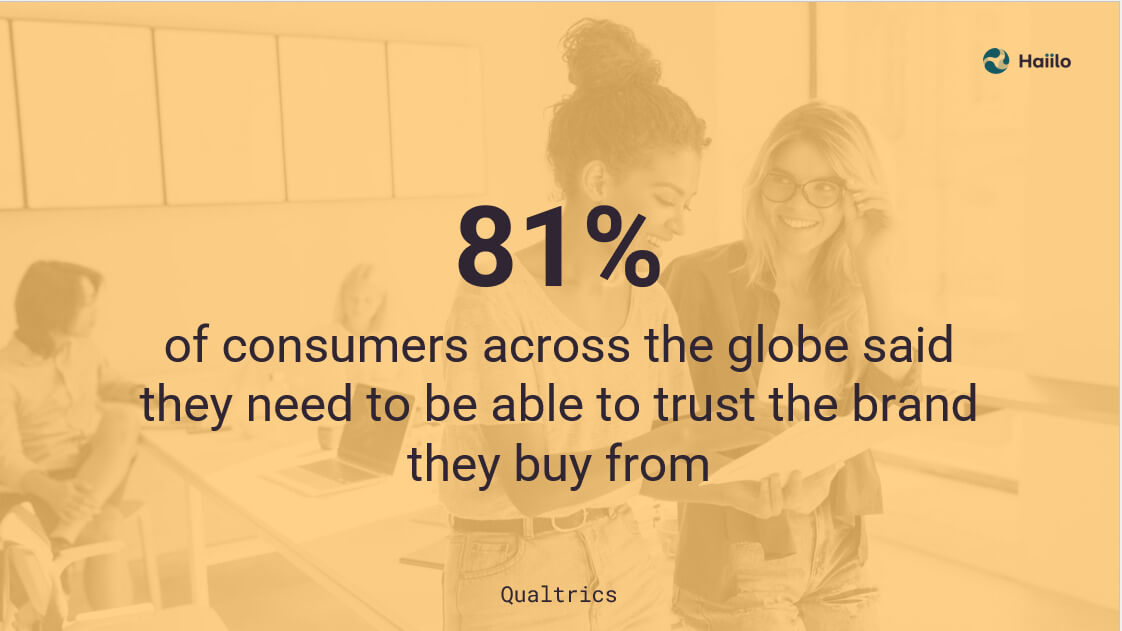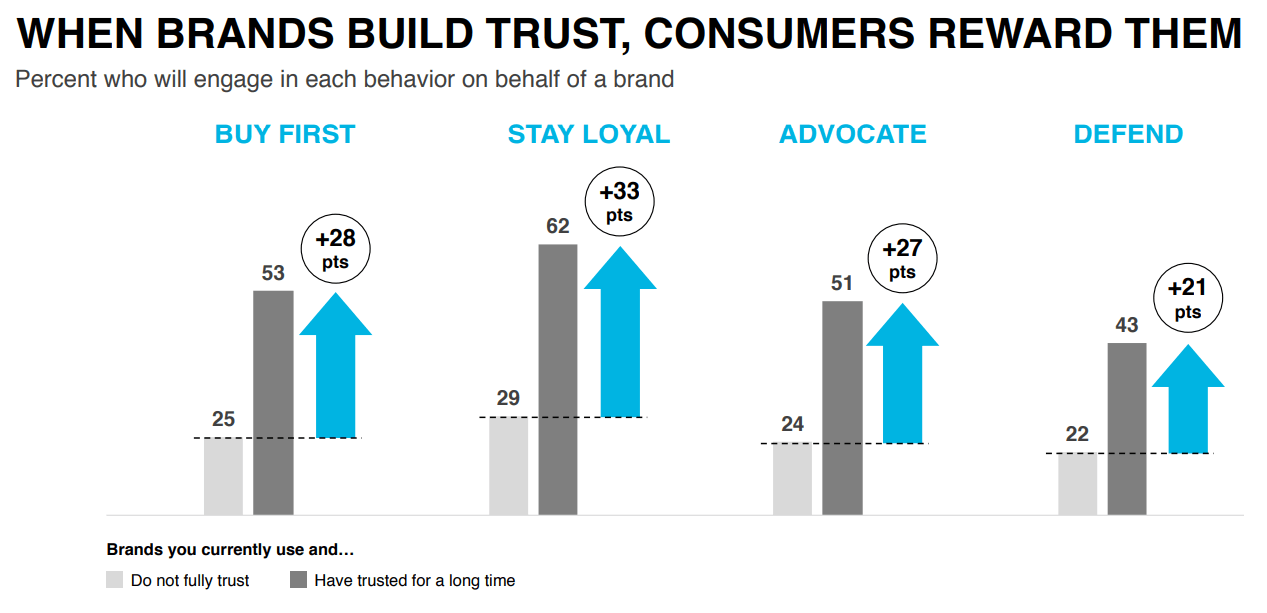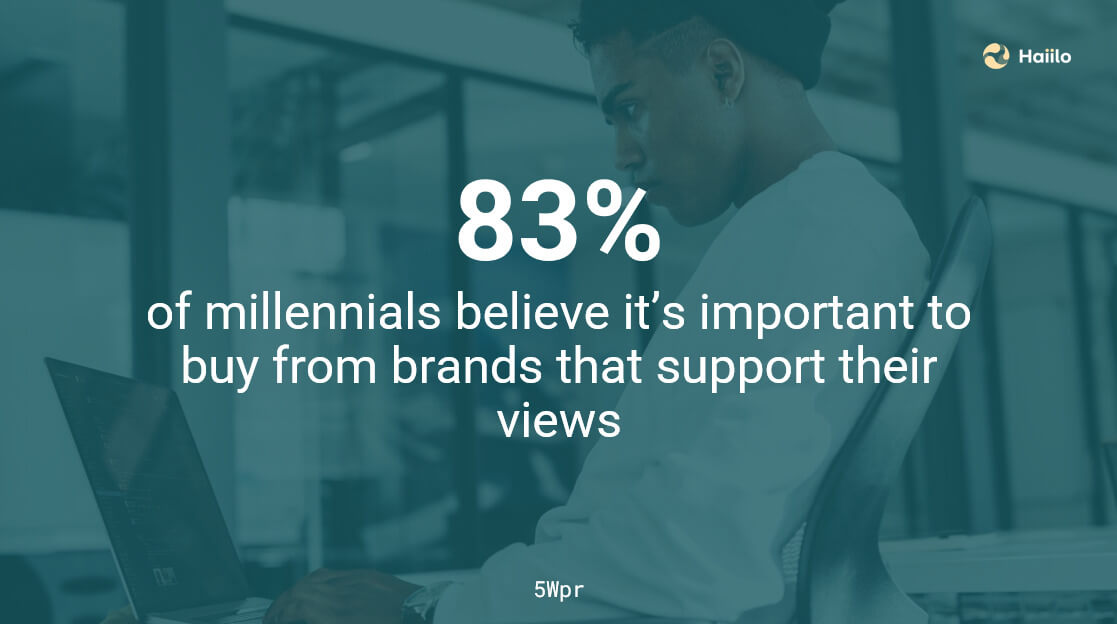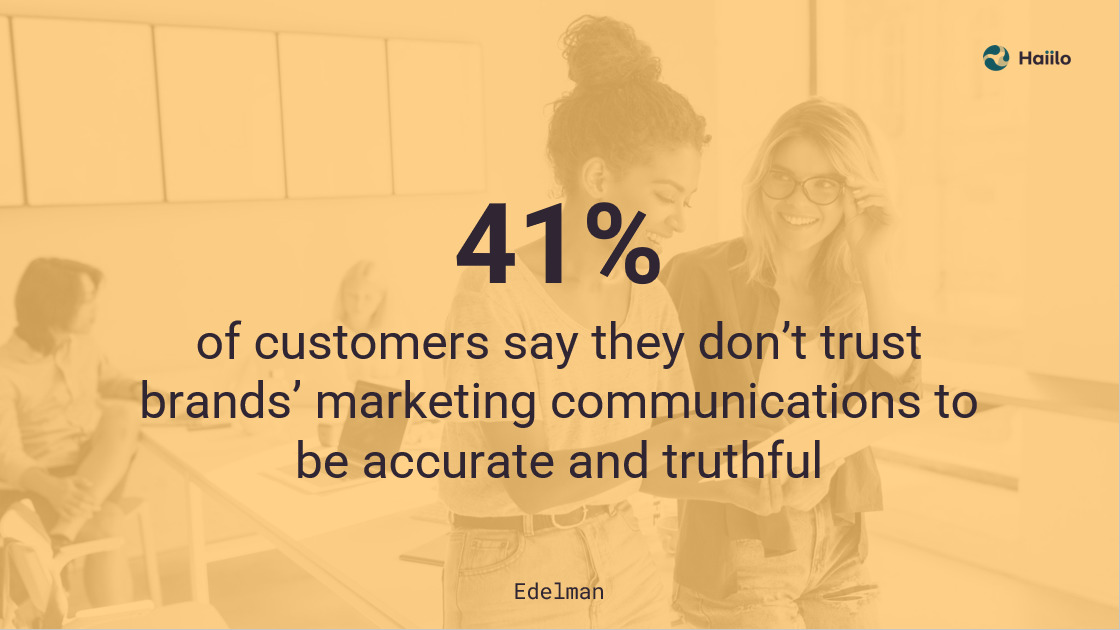Brand trust is one of the most important factors impacting customers’ purchasing decisions. Once the trust is broken, many customers never buy from those brands again.
So what are the main reasons companies care about brand trust, and how to build it? Keep reading to find out in our new blog!
Brand Trust Defined
Even though there is no unique definition of brand trust, Douglas Marketing Solutions nicely describe it as:
“branding effect that describes the relationship between a brand and its customers. Brand trust evolves from many factors, including, for example, prestige or the brand’s reputation, the products or services, and the type of communication plays a decisive role.”

Some brand experts describe brand trust as an emotion people develop toward certain brands based on how well they keep their promises and fulfill desired product or service quality.
Hence, we can say that brand trust measures customers’ confidence in a brand. Generally, the higher the confidence, the higher the sales and customer loyalty.
Brand trust can be influenced by many different factors, including:
- Product and service quality
- Social responsibility
- Customer satisfaction and customer experience
- Competence
- Value for money
- Emotionality and
- Other
💡 More resources: If you are in B2B business, LinkedIn marketing is probably important to you. If so, check out our LinkedIn marketing strategy guide!
Why Brand Trust Is Important
In Edelman’s research, customers were asked to rank 11 buying considerations in order of importance. Brand trust came in fifth place, outpacing good reviews (77%), corporate reputation (73%), and a brand’s environmental impact (7%). The top 3 factors were product quality at 85%, convenience and value at 84%, and ingredients at 82%.
With brand trust in the 5th place, it is no surprise that companies care about it. Let’s take a look into the three main reasons for why brand trust is important.
More sales
The main reason why organizations invest in improving their brand trust is improved brand awareness, more sales, and higher profits. The bigger the brand trust, the more likely customers are to buy. This is particularly true for purchasing decisions with high investments.
According to Edelman Trust Barometer Special Report, 81% of consumers across the globe said they need to be able to trust the brand they buy from.

💡 Also, learn about how to master your organization’s social selling strategy!
Better customer retention and loyalty
According to research, 65% of consumers have switched brand loyalties because the customer experience didn’t match what they had been promised by the brand’s image. The percentage is even more prominent among younger generations; 70% of Gen Z and millennials have switched brands because the customer experience didn’t meet their expectations.
As a result, people start spending less. On average, 53% of consumers reported decreasing or stopping their spending after a recent bad experience with an organization causing the risk of losing 9.5% in revenue.
💡 Customer support on social media is critical for improving CX. Check out what are the biggest social media channels today and learn more about the latest social media trends in 2022!
Customer advocacy
The biggest sign that your customers trust you is when they defend and advocate for you. So word-of-mouth marketing is often the best marketing tactic for building trust and driving more sales.

How to Build Brand Trust
In the world of information overload, many people struggle to filter through the information and separate fake from real news.
As a consequence, 69% of people fear that more brands than ever are spreading fake news or misinformation, and only 1 in 3 people say they trust most of the brands they buy or use.
So what can organizations do to rebuild trust or be perceived as more trustworthy to their customers?
Know your customers
Knowing your customers is the very first step towards providing a great customer experience. This is why many companies perform regular customer surveys, which provide them valuable insights into the factors that improve brand trust.
The fact that 80% of customers would be more loyal to a brand that understands them and what they’re looking for proves how important it is to know your customers, their needs, and preferences.
Be authentic
Authenticity is another very important factor that makes people trust brands more. It’s important to make sure that when customers see your cool logo, they can immediately connect it with the genuine values and promises your brand represents. Are your brand and communications strategy different than your competitors’ or are you just another brand in the market?
For example, 56% of people say that too many brands use societal issues as a marketing ploy to land more sales. Consequently, people start trusting these brands less even if they care about the world’s societal issues.
To build a strong brand trust, play your own game. Don’t follow the crowd!
Follow through
If you promise something, don’t fail to deliver!
Setting the right expectations is crucial for customer experience. Not setting the right expectations is one of the most common reasons why people stop trusting brands.
It’s vital that whatever you promise a customer, you can offer them exactly what you’ve described. For example, if you offer next-day delivery but can’t meet that deadline, you will fall short of expectations and hurt your brand trust.
Be consistent and stand up to your values
People perceive you as more trustworthy when your business actions, marketing campaigns, products, and services align with your company’s core values. And more and more customers purchase from businesses that align with their political or social beliefs.
This is particularly true among younger generations; 83% of millennials believe it’s important to buy from brands that support their views.

For example, if your company claims to be environmentally friendly, it is expected to use recyclable packaging. If that is not the case, customers who care about the environment will most likely turn to another provider.
Care about the first impression
People care about the first impression, and 48% of them claim that the first interaction or purchase is the best time to earn their loyalty.
According to research, it takes a mere 0.05 seconds for someone to form an opinion about your website (and your brand), so pay special attention to the first impression you make!
Pay special attention to customer experience
Earlier, we mentioned that customer service is critical for building brands people can trust. Moreover, over 73% of customers love a brand because of its excellent customer service, and this is often the best way to build trust with your buyers.
Protect your customer’s data
One research showed that 63% of North Americans would rather purchase from organizations that protect their privacy. Yet, 61% are not confident that brands have their best interests when using, storing, or sharing their personal data.
Because customers are more willing to spend their purchasing power on brands that act responsibly with their data, data privacy and security are critical for gaining, building, and maintaining brand trust.
Rethink paid advertising
Do people trust paid ads and other marketing campaigns? This is an evergreen question among marketing professionals.
In the previously mentioned report, 41% of consumers said they didn’t trust brands’ marketing communications to be accurate and truthful. Nearly three-fourths of consumers also reported that they try to avoid advertising altogether: 48% of those surveyed reported using ad-blocking technology, and 47% changed their media habits to see fewer ads.

So are paid ads worth the investment?
💡 Paid ads are not the only way to distribute your marketing content. Check out some of the more efficient content distribution strategies!
Try word-of-mouth marketing
Many marketers and other professionals agree that word-of-mouth marketing and brand advocacy are much more powerful marketing weapons than paid ads. Nielsen has found that friends and family, as well as peers, have a huge influence on brand trust – 83% of respondents across 60 countries trust their close relations’ recommendations.
💡 EXTRA TIP: Building Your Brand Trust Through Employee Advocacy
Brand ambassadorship is a great way to build brand trust. According to the Edelman report, 63% of consumers trust influencers’ opinions of products “much more” than what brands say about themselves, and 58% of people have bought a new product in the past six months because of an influencer’s recommendation.
Another research proved that 74% of people find posts from personal accounts more persuasive than posts from brand accounts.
However, people also said relatability was twice as important than popularity when it comes to product endorsements. In other words, influencers who consumers see as their peers are preferred to well-known celebrities as any given brand’s pitchman. Furthermore, 39% of potential buyers don’t see celebrity/athlete/public figure spokespeople or endorsements as a significant part of making the decision to buy.

So what is a better way to leverage the power of brand advocacy?
It’s employee advocacy!
During the past few years, we have witnessed exponential growth in the number of companies investing in their brands’ employee advocacy and employee marketing strategies. Here are a few main reasons why:
- Employee-shared content sees eight times more engagement and is shared 25 times more frequently than identical posts shared by official social media profiles of corporations
- Social media posts shared by employees have an astounding 561% further reach
- 92% of people are more likely to trust suggestions and recommendations from those they know than any advertising will do
- 90% of brands have plans to start an employee advocacy program or have already implemented a strategy to encourage employees to become brand ambassadors
- According to Fast Company, leads developed through employee social marketing convert 7 times more frequently than other leads.
- According to Kredible, on average, an employee advocacy program involving 1,000 active participants can generate $1,900,000 in advertising value.
- On average, brands generate a 650% ROI for every dollar invested in influencer and advocacy marketing
Planning, implementing, and managing a successful employee advocacy program requires the right set of tools and proper internal communications. Educating employees about the benefits and best practices of employee advocacy is essential. And to make the process more fun, engaging, and easier for employees, it is critical to implement an employee advocacy platform with the right set of features.










